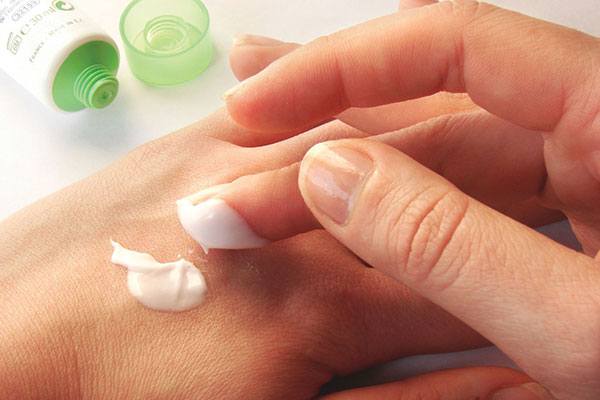Collateral Damage
How Cancer Treatment Affects Your Skin and Nails
Dry, itchy skin. Yellow, cracked nails. Cancer treatment can do a number on your skin and nails. Take these steps to minimize the damage.
Cancer treatments may cause a range of skin and nail changes. Talk with your healthcare team to learn whether or not you will have these changes, based on the treatment you are receiving:
- Radiation therapy can cause the skin on the part of your body receiving radiation therapy to become dry and peel, itch, and turn red or darker. It may look sunburned or tan and be swollen or puffy.
- Chemotherapy may damage fast-growing skin and nail cells. This can cause problems such as skin that is dry, itchy, or red, or that peels. Some people may develop a rash or sun sensitivity, causing you to sunburn easily. Nail changes may include dark, yellow, or cracked nails, or cuticles that are red and hurt. Chemotherapy in people who have received radiation therapy in the past can cause skin to become red, blister, peel, or hurt on the part of the body that received radiation therapy; this is called radiation recall.
- Biological therapy may cause itching.
- Targeted therapy may cause dry skin, a rash, and nail problems.
These skin problems are more serious and need urgent medical attention:
- Sudden or severe itching, a rash, or hives during chemotherapy. These may be signs of an allergic reaction.
- Sores on the part of your body where you are receiving treatment that become painful, wet, or infected. This is called a moist reaction, and it may happen in areas where the skin folds, such as around your ears, breasts, or bottom.
Avoid applying products with alcohol or perfume, which can dry or irritate your skin.
Ways to Manage
Your doctor or nurse will talk with you about possible skin and nail changes and recommend ways to treat or prevent them. Depending on what treatment you are receiving, you may be advised to take these steps to protect your skin, prevent infection, and reduce itching:
- Use only recommended skin products. Use mild soaps that are gentle on your skin. Ask your nurse to recommend specific lotions and creams. Ask when and how often to use them. Ask what skin products to avoid. For example, you may be told to not use powders or antiperspirants before radiation therapy.
- Protect your skin. Ask about lotions or antibiotics for dry, itchy, infected, or swollen skin. Don’t use heating pads, ice packs, or bandages on the area receiving radiation therapy. Shave less often, and use an electric razor or stop shaving if your skin is sore. Wear sunscreen and lip balm or a loose-fitting long-sleeved shirt, pants, and a wide-brimmed hat when outdoors.
- Prevent or treat dry, itchy skin. Your doctor will work to assess the cause of your itchy skin. There are also steps you can take to feel better. Avoid applying products with alcohol or perfume, which can dry or irritate your skin. Take short showers or baths in lukewarm, not hot, water. Put on lotion after drying off from a shower, while your skin is still slightly damp. Keep your home cool and humid. Eat a healthy diet and drink plenty of fluids to help keep your skin moist and healthy. Applying a cool washcloth or ice to the affected area may also help. Acupuncture also helps some people.
- Prevent or treat minor nail problems. Keep your nails clean and cut short. Wear gloves when you wash the dishes, work in the garden, or clean the house. Check with your nurse about products that can help your nails.
Talking with Your Healthcare Team about Skin and Nail Problems
Prepare for your visit by making a list of questions to ask. Consider adding these questions to your list:
- What symptoms or problems should I call you about?
- What steps can I take to feel better?
- What brands of soap and lotion are best for me to use?
- What products can help my nails stay healthy?
- What skin and nail products should I avoid?
- When will these problems go away?
If your skin hurts in the area where you get treatment, tell your doctor or nurse. Your skin might have a moist reaction. Most often this happens in areas where the skin folds, such as behind the ears or under the breasts. It can lead to an infection if not properly treated. Ask your doctor or nurse how to care for these areas.
Source: National Cancer Institute, cancer.gov
This article was published in Coping® with Cancer magazine, May/June 2017.


